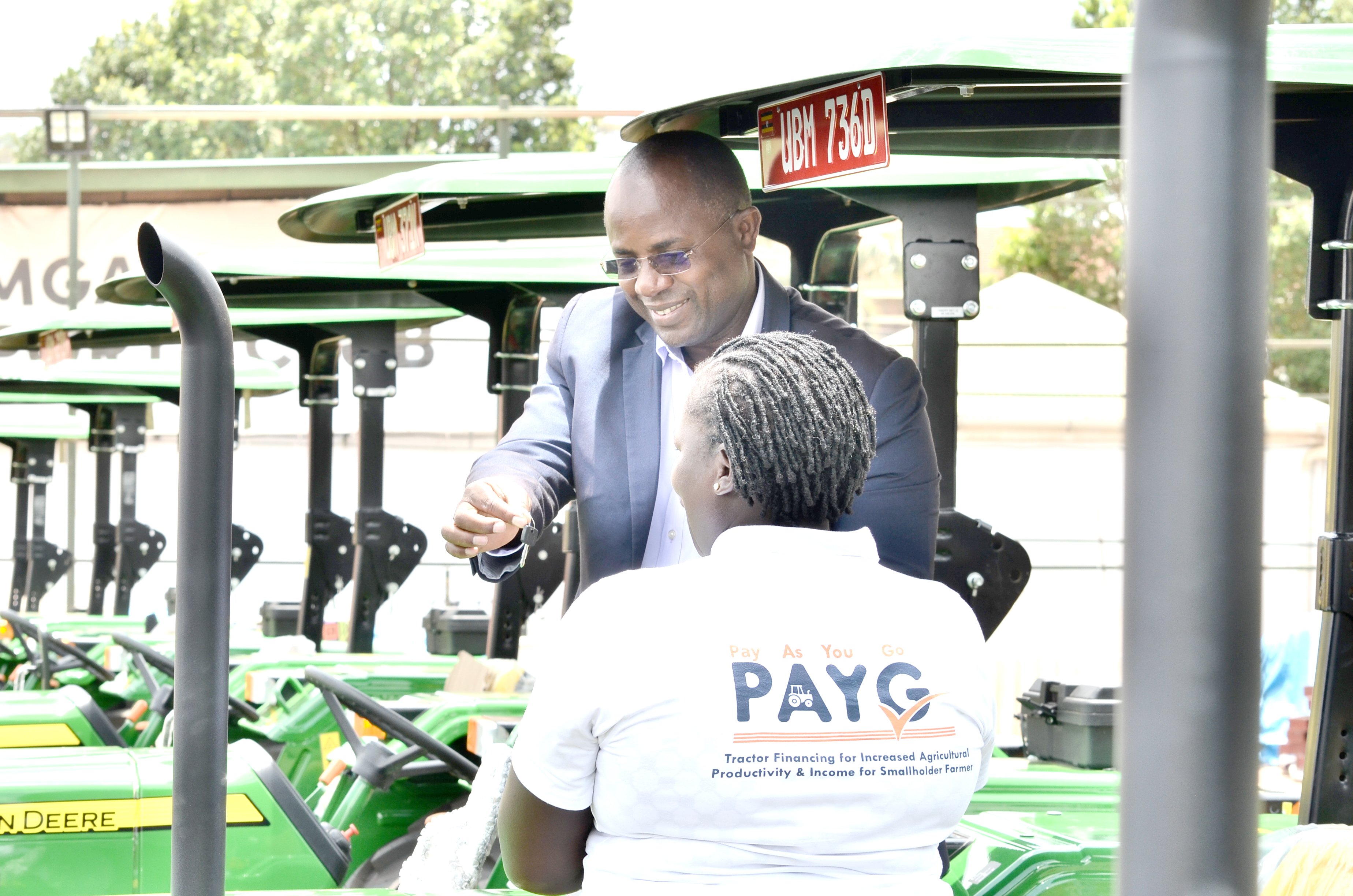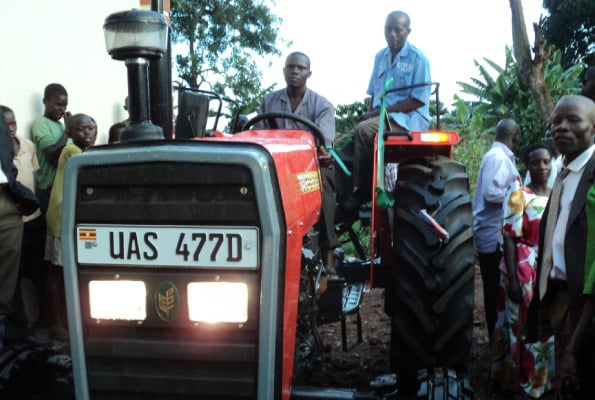Farmers to get cheaper tractors

State Minister for Agriculture Fred Bwino Kyakulaga hands over keys to a beneficiary during the launch of the tractor financing scheme at Kati Kati Restaurant. Photo/George Katongole
What you need to know:
- Fertilisers for food security crops have been subsidised up to 30 percent ahead of this planting season to help farmers with surging prices for agriculture inputs.
Agricultural mechanisation is considered as one of the big solutions to end hunger in Africa.
Reports indicate that African farming systems remain the least mechanised of all continents. About 70 percent of the farmers cultivate parcels of less than two hectares by hoe.
According to the Food and Agriculture Organisation (FAO), Africa has less than two tractors per 1,000ha of cropland.
Experts contend that a widespread replacement of manual labour and animal traction will change the face of African agriculture.
Perennial dependence on the hand hoe (80 percent), and animal traction (15 percent) has characterised our farming systems for decades, with its associated drudgery. Consequently, only 40 percent of Africa’s arable land is being utilised due to lack of the necessary equipment to open it for production.
Mechanisation can help unlock underutilised agriculture potential. The solution is to develop arrangements that enable smallholder farmers, who cannot afford to buy their own equipment, to access equipment such as tractors.
Heifer International in conjunction with Hello Tractor, a leasing platform, are distributing subsidised machinery to increase yield.
Heifer International has announced an investment of $4.5m over the next 10 years in the tractor booking platform- Hello Tractor under the Tractors for Africa project.
Subsidy
During the launch held at Kati-Kati Restaurant in Lugogo, Kampala, 11 tractors were handed over to youth entrepreneurs drawn from the districts of Dokolo, Lira, Gulu, Kole and Mubende, Abim in a subsidised model called “Pay-As-You-Go (PAYG) tractor financing.
The financing innovation is aimed at helping farmers who cannot access financing due to lack of collateral, to be able to farm productively.
William Matovu, Heifer’s country director says this model will make tractors accessible to thousands of smallholder farmers.
Founded in 2014, Hello Tractor, an agritech company, connects tractor owners and smallholder farmers in sub-Saharan Africa through a digital tractor sharing mobile app.
Social enterprise Hello Tractor benefited from a Heifer International commissioned Innovation challenge, Agriculture Youth and Technology (AYuTe) in 2021 where it was rewarded with $1m to expand its business to close the financing gap and increase farmer’s access to tractors.
“The mechanisation gap in Uganda has put the country at the back-peddle of achieving sector objectives, with potential to affect the country’s aspiration to achieve the Vision 2040. It is not surprising that Uganda imports $35m worth of food annually to meet its production deficit. Despite the opportunities such as its relatively fertile soils, good climate, cheap labour and a ready regional export market among others,” Matovu said.
The tractor handover ceremony attracted private and public industry players including heads of government parastatals, food exporters, agri-tech startups and agri-insurers, among others.
The event was officiated by the state minister for Agriculture Fred Bwino Kyakulaga. In his remarks, he acknowledged the threat of climate change to food security and the need to mechanise farming to address the looming food security threats.
“Government came up with agriculture mechanisation as a strategy of restructuring the sector. This is geared towards increasing access to cost-effective farm tools for more than 70 percent of the country’s labour force,” Kyakulaga said.
He adds that the government is supporting agricultural mechanisation particularly focusing on tractors for crop production.
Government, through the National Agricultural Advisory Service (Naads) has distributed more than 300 tractors to promote mechanisation to promote food security and fight poverty among the people.
“In the Parish Development Model, farm mechanisation is a priority to accelerate production, processing and value addition. This will ensure food security and increased family household incomes,” Kyakulaga added.
Seal of approval
The model was tested with five tractors in 2022 to test its effectiveness. Alito Joint Multipurpose Cooperative Society in Kole District was among the beneficiaries in the test phase.
Emmanuel Obedigum, the manager of the cooperative says the model is perfect for groups.
“The timing was perfect as the tractor came at the beginning of the second planting season in 2022. Since then, we have been able to plough an additional 140 acres and deposited Shs3.5m in the Hello Tractor account to finance our loan,” Obedigum said.
Challenges
Despite this potentially transformative role, mechanisation has faced stiff challenges. Promoting mechanisation among smallholder farmers is faced with numerous challenges.
Studies show that apart from the well-known problems such as lack of spare parts and credit, deforestation, soil erosion, land-use conflicts, and gender inequalities, mechanisation is constrained by the fact that there are not enough skills being developed. This includes people who can operate tractors as well as technicians.
Kyakulaga said that will be solved by the regional mechanisation centres in regional mechanisation centres in Buwama – Mpigi District (central region), Agwata – Dokolo District (northern region), Kiryandongo and Mbale districts.




